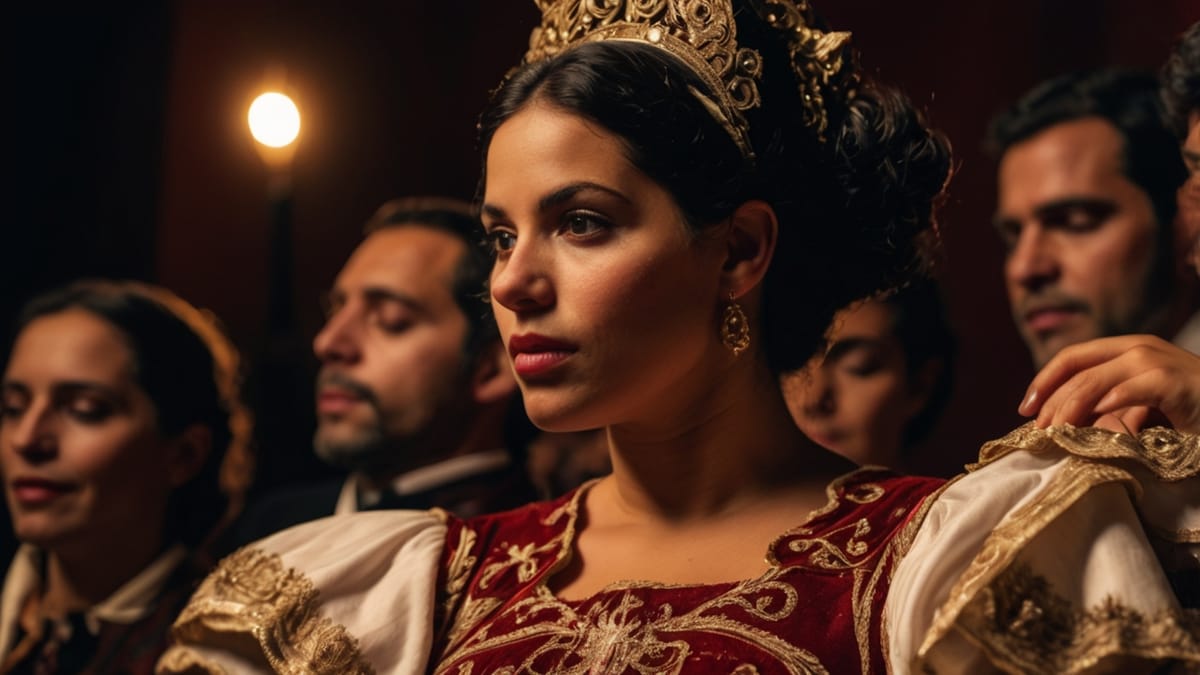Fado is more than just a musical genre
Fado, a music genre that started in Portugal in the early 19th century, blends melancholic and soulful melodies. Its haunting tunes often talk about longing, love, and loss, reflecting the heart's deepest desires.
Fado isn't just music. It's often called the “soul” of Portugal. Capturing the essence of its culture and history.
It invites you on a journey, immersing you in the rich tapestry of Portuguese life, where every note tells a story of passion and introspection. Through Fado, you can really feel the heartbeat of a nation, resonating with the universal themes of human experience.
But what makes Fado so unique and enchanting?
Let's dive a bit deeper into the magic of this melancholic music.
Let's start with a brief history of Fado
Fado's roots trace back through time, thought to come from the laments of Moorish women and the soulful cries of Portuguese sailors. These heartfelt tunes, mixed with the vibrant rhythms of Arabic and African origins, have traveled through centuries. Over time, they've evolved into the Fado we know today—a powerful blend of cultures and emotions.
In its early days, Fado grew without a set structure, thriving on the spontaneity of improvised performances. These gatherings, often tucked into cozy taverns or spilling onto bustling street corners, made Fado a shared form of expression. It broke down barriers, bringing together people from different backgrounds and ethnicities.
This communal art form tells a story of connection, where each note and lyric resonates with our shared human experience. Inviting us to explore and appreciate the cultural tapestry that binds us all.
As Fado's popularity grew, it attracted intellectuals and artists, pulling them in with a charm that only the genuine expression of the Portuguese soul could offer. They valued its authenticity. Aiming not just to preserve its raw beauty but also to elevate it into a higher art form. This led to the emergence of Fado houses—places dedicated to performing and celebrating this moving music.
Over time, Fado's journey mixed with various influences, picking up jazz rhythms and the smooth tunes of bossa nova. This blend gave Fado a fresh vibe, adding depth and making it more appealing and widespread.
The evolution of Fado shows its lasting spirit, touching hearts with its gentle tunes and sharing stories from a culture full of emotion and history.

How does emotional depth define Fado music?
Fado is a powerful mix of emotions, filled with the essence of "saudade." These hauntingly beautiful songs tell stories of unrequited love, painful separations, and the longing for times gone by. Every note paints a vivid picture of human experiences, capturing the soul's deepest desires in its melancholic melodies.
What makes the music so poignant is its ability to touch the heart. Offering comfort and relief to those navigating life's complex dance of love and loss. Each song takes you on an emotional journey, inviting you to reflect on your own stories while appreciating the rich cultural heritage of Fado. It's a celebration of life's bittersweet poetry, connecting us through universal threads that bind everyone together.
Fado takes you to a world where emotions are on full display, celebrating and understanding the raw human experience. The music acts as a means for catharsis, helping you connect with your own feelings. And find comfort in shared experiences.
Each Fado performance is a deep, intimate journey where the singer pours their heart and soul into every note. The audience, captivated by this emotional ride, adds to the atmosphere with their silent attentiveness. In these moments, Fado's rich tapestry unfolds. Pulling both performer and listener into a shared story that resonates deeply.
As Fado keeps evolving, new generations of musicians are jumping in, bringing their own experiences and perspectives to the genre. This keeps Fado a living art form, adapting to changing times while staying true to its roots.
Diving into the world of Fado is a fascinating and rewarding journey. It gives you a peek into the heart of Portugal, where where music is not just entertainment but a way of life.
How does Fado shape Portugal's cultural identity?
Fado is now a key piece of Portugal's cultural heritage, capturing the nation's spirit and identity. This music carries the soul of its people. Reflecting their joys, sorrows, and resilience in tough times.
Since its birth, Fado has spread beyond borders to resonate across the nation. It has become an iconic part of Portuguese music and a symbol of national identity. It's deeply embedded in the hearts and minds of the Portuguese. Acting as a powerful way for them to express their emotions and experiences.
You can't talk about the cultural significance of Fado without recognizing its huge impact on shaping Portugal's identity. This music is like a soundtrack of the country's history that captures the essence of its past struggles, triumphs, and cultural heritage. The melancholic tunes and poetic lyrics take you back in time, bringing a feeling of nostalgia and connecting you to their roots.
Fado and Portuguese identity
Fado is key to shaping Portugal's identity, offering a unique take on life and capturing the emotional vibrancy of the Portuguese people. This blend of history, emotion, and cultural significance, all wrapped up in music, adds to the rich tapestry of the nation's identity.
Over the years, Fado has given artists a way to share their personal experiences and views on Portuguese society. It's like a mirror, showing the hopes, dreams, and struggles of the people, and giving them a voice.
In this way, Fado is more than just a music genre. It’s a way for the Portuguese people to share their stories and connect deeply with each other.
Fado has also become a key part of Portuguese get-togethers and celebrations. Whether at a family gathering, a festive event, or a late-night session at a traditional Fado house, the music brings a sense of unity and belonging. Its haunting tunes and heartfelt lyrics draw people together. Sparking shared nostalgia and strengthening community bonds.

Fado as a UNESCO intangible cultural heritage
Recognizing how culturally important it is, UNESCO added Fado to the Representative List of the Intangible Cultural Heritage of Humanity in 2011. This acknowledgment highlights Fado as not just a national treasure, but a global testament to the universal language of music and emotion.
By earning this prestigious title, Fado has gained international recognition and protection, ensuring it's preserved for future generations. It acts as a cultural bridge, inviting people worldwide to experience the beauty and emotional depth of Portuguese music.
Plus, having Fado on the UNESCO list has stirred up a new interest in the genre. Both in Portugal and abroad. This has brought about a revival of Fado as a modern art form. With current artists adding fresh twists while keeping the traditional vibe of the music intact.
Fado plays a huge role in Portugal's culture.
It's not just a music genre. It's a reflection of the nation's history, emotions, and shared identity. From its humble beginnings in Lisbon to being recognized as a UNESCO Intangible Cultural Heritage, Fado keeps captivating audiences and stands as a powerful symbol of Portuguese culture and heritage.
What are the elements of Fado music?
Fado relies on a few essential elements: the singer (fadista), Portuguese guitar (guitarra), lyrics, and an audience to appreciate the music's emotive depth.
The role of the Portuguese guitar in Fado
The Portuguese guitar, with its unique shape and twelve strings, is key in Fado music. Its distinct sound, marked by intricate, rapid fingerpicking, sets the stage for the fadista to tell their stories of longing and loss.
This guitar, carrying a rich musical tradition, sets the mood and pace of the performance, creating a vibe full of nostalgia and emotion. The instrumental preludes (toques) are just as important to the story as the vocals.
The themes and lyrics in Fado
Through its moving lyrics, Fado delves into universal human experiences and emotions. These stories mainly focus on longing, loss, and the fleeting nature of life.
Whether it's about a heartbroken lover's sorrow, the yearning for home, or the brief moments of joy, these beautifully crafted compositions are full of raw emotion, resonating personally with listeners.
The importance of the fadista in Fado
At the center of it all is the fadista, or Fado singer. They bring the songs to life with their powerful and soulful voices, captivating the audience with every word.
The magic of Fadistas is that they are not just performers. They are storytellers, carrying the weight of centuries of Fado history in their vocals. Each one brings a unique interpretation to the lyrics, making each performance a deeply personal experience.
The connection between audience and performer
In Fado, the connection between performer and listener is essential. The emotive melodies invite listeners to connect with their feelings and memories while creating a sense of community among those present.
As the fadista pours their heart out on stage, they create an intimate atmosphere that draws in the audience. In turn, listeners offer support by clapping along or singing along, showing their appreciation for the music and connecting them to each other.
This mutual energy exchange between performer and audience makes Fado truly special.
How do prominent Fado artists shape the genre's legacy?
Lots of talented fadistas have shaped and influenced Fado. Bringing this genre to a global stage and helping it evolve.
The legacy of Amália Rodrigues
Amália Rodrigues, often called the "Queen of Fado," made an unforgettable mark on the genre. Her amazing voice and powerful performances brought Fado to global attention. Making her a beloved icon for music fans everywhere.
Besides her amazing performances, Rodrigues helped modernize Fado. She mixed in elements from other genres like flamenco and French chanson, making Fado more appealing and broadening its scope.
Some contemporary Fado artists you should know
While Amália Rodrigues laid the foundation, a new generation of Fado artists are pushing boundaries, for example:
They demonstrate that Fado’s spirit is always evolving and timeless. These artists stay true to the traditional elements while adding their own personal flair. This shows that Fado, much like the emotions it captures, is universal and endlessly adaptable.
Where in Portugal should I experience Fado?
There is no better way to experience Fado than in its heartland. The Fado houses in Lisboa and Porto offer intimate performances that will touch your soul.
Fado houses in Lisbon
In Lisbon, visit the Alfama district. It's Lisbon's oldest quarter, famous for its vibrant Fado scene. Traditional Fado houses are:
Here's a map to help you navigate through Alfama's fado houses:
They host live performances that take you right to the heart of Portuguese culture.
Spending an evening in these spots, surrounded by soulful music, enchanting lights, and the aroma of Portuguese cuisine, gives you a unique and immersive experience in appreciating Fado.
Fado performances in Porto
Porto, too, is home to several Fado houses, each offering a uniquely heartwarming experience.
Here are a few to check out:
And here's a map to help you navigate through the Fado houses in Porto:
They're iconic spots in Porto where you can enjoy Portuguese food and wine with the soulful sounds of Fado music playing in the background.
When in Portugal, a visit to these Fado houses is a chronicle of an emotional journey through music. An experience that resonates deeply with every listener and remains etched in their hearts forever.
Fado isn’t just music
Fado is more than just a musical genre.
It's a deeply rooted cultural expression that goes beyond time and geography. With its heartfelt melodies and touching lyrics, Fado captures the human experience, telling stories of love, loss, longing, and deep introspection.
The genre has grown thanks to both legendary and modern fadistas, keeping its timeless charm and emotional depth intact.
Experiencing Fado in its home country of Portugal offers a deep connection to the nation’s soul, leaving a lasting impression long after the music stops.
Whether you're in a cozy Fado house in Lisbon or Porto, the enchanting vibe and raw emotion of Fado make for an unforgettable journey into cultural heritage and personal reflection.
P.S. Here's a Fado performance by Mariza to give you a taste of its emotive power:




